2017-2018学秋季学期高一英语备课组备课稿
[教学计划]2017-2018学年高三英语下学期备课组工作计划范文
![[教学计划]2017-2018学年高三英语下学期备课组工作计划范文](https://img.taocdn.com/s3/m/f34d6212844769eae009edb8.png)
一、指导思想XX年高考英语科备考,我们将以《安徽省高考英语科考试说明》为依据,以新课程标准为.准绳,以牛津新课标版的高中英语课本为基础,制订详细周密的复习计划,切实抓好高三英语复习工作。
密切关注高考动态,联系学生实际,通过专项和综合训练,努力提高学生运用英语知识的能力和答题技巧,以适应新的高考形式和要求。
二、学生情况分析本届高三学生的英语成绩普遍较差,反映出学生基础知识薄弱,解题能力较差。
面对高考压力,学生的学习态度已有大的改观。
在两年的高中英语学习中,大多数学生的听、说能力确有提高,但同时部分学生读、写能力没有明显提高,使用英语准确性差,单词拼写错误、语法错误百出,少数学生在学习过程中缺乏主动性和积极性。
学生中普遍存在单词积累太少、,.好的学习习惯与方法还未养成。
学生学习能力之间的差距在试卷上得到一定的呈现。
大多数学生在语法和词汇、完形填空、阅读理解得分率比较低,尤其是面对较复杂的单选题,无从下手。
所以在复习过程中要注重落实考点,激发学生的英语学习热情,逐步培养学生英语能力,全面提高学生成绩三、具体复习备考措施(一)努力提升六个方面的认识,明确教学要求1、对《新课程标准》、《XX年考试大纲》和XX年高考安徽卷英语试题要有深入了解,对高三一学年各阶段性教学工作的目标、任务和要求要有所了解,以加强高三英语教学工作的有序性.。
2、了解自己所教班的学生的语言知识基础和能力发展情况,了解自己班级存在的差距,以加强教学工作的针对性.。
3、认真研究目前使用的教材,对照《新课程标准》和《考试大纲》,准确掌握其重点、难点和高考知识考点的分布情况。
4、在新课程背景下重新审视高三英语教学模式,认真研究各阶段的教学策略和复习指导方法等,确保每一阶段教学的准确和高效。
5、在学习课程标准的基础上认真研读《高考考试说明》和研究XX年、XX年安徽高考英语试题,努力准确把握XX高考的发展、变化趋势。
6、根据新课程的教学体系及考试要求的调整变化,认真研究手头的各种参考资料和练习题,精编、精选、精练,以加强训练的针对性和有效性。
高一-英语2017-2018学年度教案(2)

必修Unit2 The Olympic GamesThe First Period教学内容Teaching Contents: Warming up & Speaking.教学目标Teaching Aims:A. Talk about sports.B. Get to know the common information about the Olympic Games.C. Grasp the ways of talking about interests and hobbies. 教学重难点Teaching Key Point: Talking about interests and hobbies.教学方法Teaching Methods: Communicative Method, Grammar-translating Method教学过程Teaching Steps:Step A Warming up1. You must know a lot about sports from everyday lifeand media, so test your knowledge---. Then check theanswers.2. Introduce the topic of the unit and activities thestudents finish the quiz.Step B Speaking1. Introduce: Practice expressing the students’ opinion about sports.2. Review vocabulary about different kinds ofsports.3. Read and explain useful expressions.4. Ask the students to interview their classmates.Make sure that the students give at least onereason to support their opinions. If necessary,the teacher can provide examples of reasons forliking a sport.5. Report different opinions.6. Language points: prefer--- to---, be interestedin---, would rather do sth than do sth.Step C HomeworkThe Second Period教学内容Teaching Contents: Listening.教学目标Teaching Aims:A. Improve the students’ listening ability.B. Talk about the results of matches.教学重难点Teaching Key Point:Practice listening skills--- pick out detailed information from what they heart on the tape.教学方法Teaching Methods: Communicative Method, Grammar-translating Method教学过程Teaching Steps:Step A Pre-listening1. Introduction: Practice picking out detailed information from listening materials.2. Explain new words: win against---, score--- points,league games, took a 2-1 lead, doubles match,singles matches.Step B While-listeningListen to the materials three times and try to answer the questions.Step C Post-listening1. Check the answers to the questions.2. Listen again and re-check the answers.3.Summarize the sentences which express the results of the matches.Step D HomeworkThe Third Period教学内容Teaching Contents: Pre-reading and Reading.教学目标Teaching Aims:A. Get to know more about the common knowledge about the Olympic Games.B. Understand the main meaning of the text.教学重难点Teaching Key Point: Practice reading--- find out the topic of the each paragraph.教学方法Teaching Methods: Communicative Method,Grammar-translating Method教学过程Teaching Steps:Step A Pre-reading: Introduce the topic of the text and help activate background knowledge.Step B Reading1. The reading gives a brief summary of the historyof the Olympic Games and its development over theyears.2. Listen and read para1, then explain and find outits topic.3. Language points: take part in---, every fouryears.4. Listen and read para2 & 3, then explain and findout the topics.5. Summarize the first three paragraphs: theyexplain how the Olympic Games have changed overthe years and gives examples of some of thespecific changes.6. Ask the students to answer the followingquestions:a. How often are the Olympic Games held?b. What were the old Olympic Games like?c. When did the Olympic Games begin?Step C HomeworkThe Fourth Period教学内容Teaching Contents: Reading and Post-reading.教学目标Teaching Aims:A. Continue to learn the text well.B. Know more about the 2008 Beijing Olympic Games .教学重难点Teaching Key Point: Talk about good/bad effects on the host city of the Olympic Games.教学方法Teaching Methods: Communicative Method, Grammar-translating Method教学过程Teaching Steps:Step A ReviewStep B Reading1. Listen and read para4,5.2. Explain its meaning and find out the topics:Para4--- the Olympic motto, para5--- the 2008 Beijing Olympic Games.3. Language points: ---, ranking third of all the competing countries.Following---, China won --- for a medal. (the usage of v-ing)4. Summary: China success in recent Olympic Games. Step C Post-reading1. Discuss the good/bad effects on the hosting city of the Olympic Games.2. Report different ideas.Step D HomeworkThe Fifth Period教学内容Teaching Contents: Language Study & Integrating Skills.教学目标Teaching Aims:A. Review key words about the Olympic Games.B. Practice the Future Passive Voice.C. Get to know more about sports--- a great Chinese basketball player, Yao Ming.教学重难点Teaching Key Points:A. Key words about the Olympic Games.B. Grammar —the Future Passive Voice.教学方法Teaching Methods: Communicative Method, Grammar-translating Method教学过程Teaching Steps:Step A Check the answers to the homework and review key words.Step B Grammar1. Explain: To form the Future Passive Voice, use willbe done, which gives the idea that something willhappen in the future.2. Give an example: The 29th Olympic Games will be heldin Beijing.3. Practice: According to the example, turn thesentences into the Future Passive Voice.4. Check the answers, then explain differentsentences.Step C Integrating Skill: Read and listen the reading passage, then explain its meaning.Step D HomeworkUnit3 ComputerThe First Period教学内容Teaching Contents: Warming up & Speaking.教学目标Teaching Aims:A. Talk about science and technology.B. Practice expressing agreement and disagreement.教学重难点Teaching Key Point: Grasp the ways of expressing agreement and disagreement.教学方法Teaching Methods: Communicative Method, Grammar-translating Method教学过程Teaching Steps:Step A Warming up1. How creative are you? Are you good at solvingproblems and thinking in new ways?Work together with your partner and solve these problems. If possible, ask the students to come upwith more creativity tests.2. Explain questions and possible answers.Step B Speaking1. Explain the instructions to the class: preparea role play and have a discussion. Each groupmember will play on e of the roles.2. Useful expressions: be worth doing sth, be suredoing sth.3. Report the dialogues by using expressions as moreas possible.Step C HomeworkThe Second Period教学内容Teaching Contents: Listening.教学目标Teaching Aims:A. Improve the students’ listening ability.B. Practice describing things and how they work.教学重难点Teaching Key Point: Practice listening skills. 教学方法Teaching Methods: Communicative Method, Grammar-translating Method教学过程Teaching Steps:Step A Pre-listening1. Introduction: The students will hear descriptionsof everyday objects and asked to try to guess whatis being described. Then give an example ofexpressing an everyday object.2. Explain new words: thumb, pick up, button, catcha cold, shelf-shelves, kitchen.Step B While-listening: Listen to the materials three times and try to answer the questions.Step C Post-listening1. Check the answers to the questions.2. Listen again and re-check the answers.3. Discuss their possible uses. Encourage thestudents to think of new uses for objects.Step D HomeworkThe Third Period教学内容Teaching Contents: Pre-reading and Reading.教学目标Teaching Aims:A. Practice summarizing the topic/outline.B. Understand the main meaning of the text.教学重难点Teaching Key Point: Summarize the topic/outline. 教学方法Teaching Methods: Communicative Method, Grammar-translating Method教学过程Teaching Steps:Step A Pre-reading: To discuss the questions and answer them in order to get the students to think aboutthe cellphone as an example of interviews thathave changed our way of life.Encourage students to think more about question3—Will popular science lead science inthe wrong directions?Step B Fast-eadingListen to the whole text and answer: What does the title “Life on the go” mean?Encourage the students to take a circle view of the cellphone culture.Step C Careful-reading1. Ask the students to read the first paragraphquickly to get the main idea of the text.2. Listen and read para2, then summarize its topic.3. Language points:take out--- and press the talk key, ---more than---,remind sb about sth/of doing sth.Step C HomeworkThe Fourth Period教学内容Teaching Contents: Reading and Post-reading.教学目标Teaching Aims:A. Continue to learn the text well.B. Promote the students’ ability of reading comprehension.教学重难点Teaching Key Point: Summarize the outline of the text.教学方法Teaching Methods: Communicative Method, Grammar-translating Method教学过程Teaching Steps:Step A Review: Listen to para1&2 and have a review. Step B Careful-reading1. Listen and read para3. Then summarize its topic: Cellphones also cause problems.2. Explain its meaning and try to answer the following question.3. Listen and read para4,5.Then summarize its topic and find out some examples to support it.4. Language points: agree (not) to do sth, I don’tdare to do sth, spend---on---, stay in touch with,no matter where--- = wherever---, in case of anemergency.Step C Post-reading1. Listen and read the whole text and try to answer the questions.2. Help the students to finish the outline of the text. Then discuss your own cellphone.Step D HomeworkThe Fifth Period教学内容Teaching Contents: Language Study & Integrating Skills.教学目标Teaching Aims:A. Explain and practice the grammar--- The Present Continuous Passive Voice.B. Understand the reading passage well.C. Talk about love and friendship.教学重难点Teaching Key Points:A. Grammar — Present Continuous Passive Voice.B. Get the students to be aware of the point--- love and friendship will make the world better.教学方法Teaching Methods: Communicative Method, Grammar-translating Method教学过程Teaching Steps:Step A Check the answers to the homework. If necessary, explain the difficult exercises.Step B Grammar1. Explain: am/is/are + being done.2. Giver some examples and practice some.Step C Reading practice1. Listen and read the passage. Then explain its meaning.2. Pay attention toe some language points.Step D Homework: According to the requirement, write an letter.Unit4 Wildlife protectionThe First Period教学内容Teaching Contents: Warming up & Speaking.教学目标Teaching Aims:A. Talk about wildlife endangerment.B. Talk about ways to protect the environment.C. Practice reporting an interview..教学重难点Teaching Key Points: Talk about ways to protect the environment.教学方法Teaching Methods: Communicative Method, Grammar-translating Method教学过程Teaching Steps:Step A Warming up1. Introduce the pictures and give the students someexamples of issues and questions related to thetheme of the unit: protecting the environment andwildlife.2. Ask the students to think of other endangeredanimals and list reasons for their endangerment.Encourage the students to think about ways thathumans and animals can help each other and livetogether in peace.Step B Speaking1. Use an interview format to practice talking about animals and animal protection.2. Work in pairs. One student will be the reporterand should prepare questions for the interview.The other student will be the animal and prepareanswers. When both students are ready, theyinterview each other and take turns being thereporter and the animal.3. Act out your dialogue.4. Talk about some ways to protect the environment. Step C HomeworkThe Second Period教学内容Teaching Contents: Listening.教学目标Teaching Aims:A. Improve the students’ listening ability.B. Talk about the causes and effects of various types of pollution.教学重难点Teaching Key Point: Talk about the causes and effects of various types of pollution.教学方法Teaching Methods: Communicative Method, Grammar-translating Method教学过程Teaching Steps:Step A Pre-listening1. Ask the students a few helpful questions.2. Explain new words: breathe, fresh, burn oil or coalfor---, drainage, valleys, a lot of rubbish,Unfortunately, having a negative effect on---. Step B While-listening: Listen to the materials three times and try to answer the questions.Step C Post-listening1. Check the answers to the questions. Keep in mindthat there are no set answers here, so “avoid”giving answers. Try to think and come up withtheir own answers.2. Listen again and re-check the answers.Step D HomeworkThe Third Period教学内容Teaching Contents: Pre-reading and Reading.教学目标Teaching Aims:A. Talk about wildlife endangerment.B. Understand the main meaning of the text.C. Talk about ways to protect the environment.教学重难点Teaching Key Point: Talk about ways to protect the environment.教学方法Teaching Methods: Communicative Method, Grammar-translating Method教学过程Teaching Steps:Step A Pre-reading: Help the students talk about the way humans and wildlife interact with each other anddepend on each other.Step B Fast-reading1. Introduction: The reading stresses the fact thatthe way we liver id threatening animals, plants,and our planet. We are all responsible for thefuture of the earth and we must learn and act morecarefully.2. Listen and read the whole text and know about itsmain topic.Step C Careful reading1. Listen and read para1,2.2. Explain difficult language knowledge: keep---from doing---, on a tour of---, die out, do harmto---, take measures to do sth, adapt to + n,habitat, original, be used to---3. Help the students understand the texts.Step C HomeworkThe Fourth Period教学内容Teaching Contents: Reading and Post-reading.教学目标Teaching Aims:A. Continue to learn the text well and summarize its main theme.B. Talk about ways to protect the environment.教学重难点Teaching Key Point: Encourage the students to report their own opinions.教学方法Teaching Methods: Communicative Method, Grammar-translating Method教学过程Teaching Steps:Step A Review1. Listen and read the first two paragraphs.2. Answer the questions: Students had better answerthem by using the sentences in the text or theirown words.Step B Careful Reading1. Ask the students to read para3 quickly.2. Explain its meaning and summarize the topic.3. Language points: by doing = through the uses/meansof---, what + clause---.Step C Post-reading: Work in pairs and list some measures about environmental protection.Step D HomeworkThe Fifth Period教学内容Teaching Contents: Language Study (Word Study and Grammar).教学目标Teaching Aims:A. Practice the usage of important phrases.B. Learn about the prefix: “re”.C. Review Direct and Indirect Speech.教学重难点Teaching Key Point: Grammar —Present Continuous Tense for future actions.教学方法Teaching Methods: Communicative Method, Grammar-translating Method教学过程Teaching Steps:Step A Review1. Check the answers to the homework.2. Explain the exercises students met: in danger,first of all, thank for---, care about---, make abig difference.3. Explain the prefix “re” (means: again).4. List some similar words and explain their meanings.5. Review other prefixes and list some examples.Step B Grammar1. Explain what Direct and Indirect Speech are.2. Review the methods of changing Direct and IndirectSpeech into another.Statements → that从句General Questions → whether/if从句Special Questions → wh- 从句Imperatives → (not) to do sth3. Practice some exercises.a. “I prefer maths to physics, ”he said.--- He said(that) he preferred maths to physics.b. She told me not to buy a cellphone.--- She saidto me, “Don’t buy a cellphone”.Step C HomeworkThe Sixth Period教学内容Teaching Contents: Integrating Skills & Checkpoint.教学目标Teaching Aims:A. Talk about ways to protect the environment..B. Get to know about the making methods of posters.C. Review Direct and Indirect Speech.教学重难点Teaching Key Point: Talk about ways to protect the environment.教学方法Teaching Methods: Communicative Method, Grammar-translating Method教学过程Teaching StepsStep A Integrating Skills1. Introduction: The reading introduces the principlereduce, reuse, recycle, and respond the questions.Encourage the students to think of more things wecan do.2. Listen and read the passage.3. Work in pairs/groups to talk about ways to protectthe environment freely.4. Get the students to know about the common knowledgeabout posters.Step B Grammar1. Check the answers together.2. Review the changes from Direct Speech to Indirect Speech.Step C Checkpoint (Review useful expressions in this unit.)Step D SummaryUnit5 MusicThe First Period教学内容Teaching Contents: Warming up & Speaking.教学目标Teaching Aims:A. Talk about different kinds of music.B. Practice giving advice and making suggestions.教学重难点Teaching Key Point: Practice giving advice and making suggestions.教学方法Teaching Methods: Communicative Method, Grammar-translating Method教学过程Teaching Steps:Step A Warming up1. Introduction: The songs and the questions can beused to get the students to think about what musicsounds like in different parts of the world.2. Listen to the songs and guess where the music comesfrom.3. If students have difficulty explaining theirchoices, try asking them what the music makes themthink of, or ask them to listen for differentinstructions, rhythms and sounds.Step B Speaking1. Explain the instructions. Then ask students torole-play the example in pair.2. Language points: have sth/sb in mind, considerdoing---, dance to, It would be better to do---,advice/suggestion, advise/suggest.3. Work in pair: When the students have solved theproblem, ask about solutions and compare answers.4. Pole-play students’dialogue by using theexpressions in the table.5. Ask students to think of more situations. Ifpossible, do more pair role-play’s after class.Step C HomeworkThe Second Period教学内容Teaching Contents: Listening.教学目标Teaching Aims:A. Improve the students’ listening ability.B. Talk about songs, music, feelings, like and dislikes. 教学重难点Teaching Key Point: Practise talking about different feelings after listening.教学方法Teaching Methods: Communicative Method, Grammar-translating Method教学过程Teaching Steps:Step A Pre-listening1. Introduction: Listen to three songs and talkabout what they think and feel about it.2. Explain new words: fault, settle down, be calm, order(ed).Step B While-listeningListen to the materials three times and talk about the questions.Step C Post-listening1. Encourage students to answer the questions. Compare answers and try to explain them.2. Pick out the one you like best.Step D HomeworkThe Third Period教学内容Teaching Contents: Pre-reading and Reading.教学目标Teaching Aims:A. Talk about different sounds of the words.B. Understand the main meaning of the text.C. Practice finding out the topic.教学重难点Teaching Key Points: Reading skill--- finding out the topic.教学方法Teaching Methods: Communicative Method, Grammar-translating Method教学过程Teaching Steps:Step A Pre-reading: Tell the students to work in groups.One student in each group asks the other groupmembers the for pre-reading questions. Visit eachgroup and make sure that each group memberparticipates. Help the students with vocabularyif necessary.Step B Reading1. The reading discusses the globalization of popularmusic and how various styles of music influence eachother.2. Listen to the whole text once and try to make theoutline of this text.3. Listen and read para1. Then explain its meaning andfind out the topic.4. Ask the students to read para2 quickly.5. Explain it and find out the main idea.6. Language points: a world of ---, a brief look at---,--- have been playing the blues---,African-American culture.Step C HomeworkThe Fourth Period教学内容Teaching Contents: Reading and Post-reading.教学目标Teaching Aims:A. Continue to learn the text well.B. Finish Post-reading with high efficiency.教学重难点Teaching Key Point: Finish Post-reading with high efficiency.教学方法Teaching Methods: Communicative Method, Grammar-translating Method教学过程Teaching Steps:Step A Review: Listen them once and answer Q1.Step B Reading1. Listen and read para3.2. Explain its meaning and find out the topic word--- rap. Then answer Q2.3. Listen and read para4.4. Explain its meaning and find out its topic. Then answer Q3.5. Ask the students to read para4 by themselves.6. Explain its meaning and find out the topic word.7. Review its outline.8. Language points: have--- in common, hear new thingsin old beat, a wide variety of---, every corner ofthe world.Step C Homework ---Post-readingThe Fifth Period教学内容Teaching Contents: Language Study (Word Study andGrammar).教学目标Teaching Aims:A. Impress the key vocabulary in this unit..B. Practice the Passive Voice in different tenses..教学重难点Teaching Key Point: Grammar —Present Continuous Tense for future actions.教学方法Teaching Methods: Communicative Method, Grammar-translating Method教学过程Teaching Steps:Step A Check the answers to the homework.Step B Word Study1. Ask the students to work together and guess themeaning of the words in italics in each sentence.Then summarize different meanings of one word.2. Useful phrases: beat-follow the beat, pick-pickup, pick out; rock-, style-in the latest style. Step C Grammar1. Review the basic formations: the Passive Voiceindifferent voice.2. Rewrite some sentences using the Passive Voice.Then check the answers.3. Ask the students to finish Ex2 together. Help themif necessary.Step D HomeworkThe Sixth Period教学内容Teaching Contents: Integrating Skills & Checkpoint.教学目标Teaching Aims:A. Practice reading comprehension.B. Talk about traditional music and modern music.C. Write a fan letter.教学重难点Teaching Key Point: Language knowledge.教学方法Teaching Methods: Communicative Method, Grammar-translating Method教学过程Teaching Steps:Step A Reading comprehension1. Listen and read the passage carefully and try toget the main idea about it.2. Read the outline below and keep the questions inmind.3. Help the students complete the chart.4. Compare traditional Chinese music and modernChinese music. Start by completing the chart below,and then write a short essay in which you compare thetwo styles of music.(Write is assigned as homework.)Step B Checkpoint (Review useful expressions in this unit and finish the blanks.)Step C Summary。
高一年级英语集体备课教案一
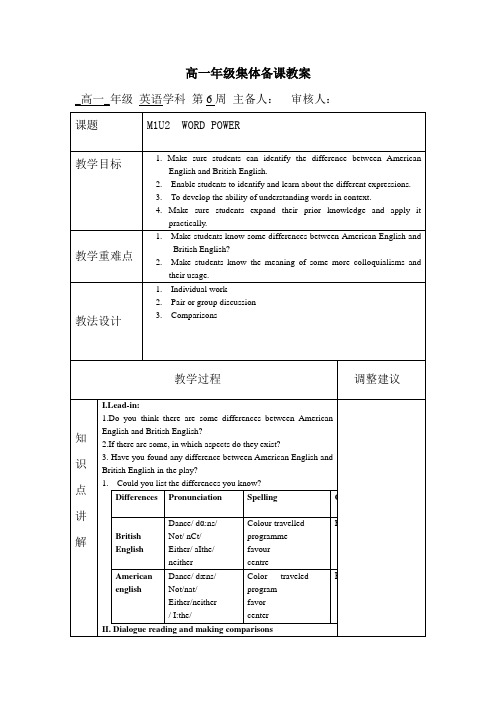
4. All the family members come to persuade Jim to change his idea, but he isas stubborn as a mule.
pull my leg: joke with someone (愚弄某人)
B). 1.green fingers(绿手指,园艺能手):She is good at gardening
2.be all thumbs(笨拙):He is very clumsy.
3.the pot calls the kettle black(五十步笑百步):Pointing out a person's fault when one is guilty of the same or a similar fault /That is like criticizing someone else for a fault you have yourself.(烏鴉嫌豬黑,半斤八兩,大哥笑二哥)
Tim: This one? Oh, it is _________________. I can tell you.
3. Jim, when I explain the language points, you should _________________.
Sam:Excellent, during my summervacationI joineda soccer ball club and I can play it better now.
David: Good! I also practised playingfootball this summer too.
2017-2018第2学期高年级组集体备课

横岗保安学校英语科组集体备课活动记录活动结果本单元来自上海教育出版社出版的小学五年级英语教材Unit4 Reading is fun为情境主线。
本单元的核心词汇:magazine, dictionary, newspaper,buy, week, student。
本单元的核心句型:I’m going to read a story every day标、教材和学情,为使本课的教学更具整体性和递进性,本单元的学习将对教材内容顺序进并对文本内容进行适当再构。
以 Book Week为语境主线,设计了Week, Buying books for Book Week和 About the books we like三个单课话题。
学生在横岗保安学校英语科组集体备课活动记录活动结果本单元是Module 2Work and play中的Unit 6 PE lessons,是基于言知识点的进一步升级。
学生在5A、5B Module 3已学过许多关于运动的语言知识,分,旨在通过会话情景,运用新旧结合句型“We have two PE lessons at school every week. Sometimes we play ball games .My friends and I like playing sport. Enjoy your swimming ”体现知识与能力的螺旋式上升。
语音方面,通过歌谣和引入课外阅读,章中学会了解字母y, h, w, wh, l, r, rr在单词中的发音。
横岗保安学校英语科组集体备课活动记录横岗保安学校英语科组集体备课活动记录横岗保安学校英语科组集体备课活动记录果通过医患对话以及日常保健建议,使学生对就医过程和医疗保健建立起系统认知。
利用教材故事中的反面角色进行教育,同时达到了和让学生独立思考的目的。
由于题材与生活联系紧密,我们引入了课外绘培养学生核心素养。
基于教材与学情,本单元以书中人物 Kitty为主线,描述成一名生活习惯不太好、经常生病的孩子,横岗保安学校英语科组集体备课活动记录活动结果教材分析本单元是Module4 Things we enjoy 中的Unit11 Western festival。
2017-2018学年高一英语译林版必修5教学案:Unit 3 Sec

Ⅰ.单词拼写1.They are conducting (实施) an experiment with the intention of finding a better way to do that.2.In primary schools, women teachers are in the majority (大多数).3.We can confirm (确认) a room for next Saturday.4.We began to work after a brief (简短的) conversation.5.His mother-in-law is an expert at food science and nutrition (营养).Ⅱ.拓展词汇6.professionn.行业,职业→professional adj.职业的,专业的7.radiation n.辐射,放射线→radiative adj.放射性的8.original adj.原来的,起初的;首创的;非复制的→origin n.起源;来源;起因9.judgement n.判断力;看法,评价;(法律)判决→judge v.评价;判断n.法官10.relation n.关系;亲戚→relate vt.使互有关联11.summary n.总结;概括,概要→summarize vt.概括;总结12.consideration n.仔细考虑;必须考虑的因素;体谅,顾及→consider v.考虑;认为→considerate adj.体贴的,体谅他人的,考虑周到的13.tasty adj.美味的,可口的→taste v.品尝14.reliable_ adj.可信赖的,可依靠的→rely v.依赖,依靠15.actual adj.真实的,实际的→actually adv.实际地[巧记单词]Ⅲ.补全短语1.turn out证明(是);结果(是)2.figure out 想出,理解;弄清楚;计算出,演算出3.be similar to 与……相似4.put ... in place 把……准备就绪,布置妥当5.in summary 总之,概括地说6.compared with 与……相比较7.follow in one's footsteps 效仿某人8.in the field of 在……领域9.the same as 与……相同10.be/get burnt out 耗尽体力,累垮11.public relations 公共关系12.take ...into consideration 认真考虑1.[教材原句]He is always working in his lab, trying to figure out all the mysteries that make him puzzled.他总是在实验室里工作,努力弄明白困惑他的所有奥秘。
2017高一英语备课组集体备课方案

2017高一英语备课组集体备课方案一、指导思想:面对英语的学科地位,以新课程理念为指导,在全面实施新课程过程中,积极探索符合新课程理念的英语教学方法和学生积极自主化学习方式。
培养学生良好的学习习惯,力争使学生形成踏实、严谨的学风。
一方面努力夯实高一学生英语听、说、读、写的基础;另一方面努力做好全面提升,指导学生广泛开展英语精读和泛读,为下一学年的全面提高英语成绩奠定基础。
本备课组共有14位教师,每位老师均具有一定的教学经验,期望经过全组老师的努力,做到以下几点:1. 全组老师团结协作,相互帮助,取长补短,努力打造一个积极向上、充满活力的优秀英语备课组。
2. 定期组织教学研究活动,围绕相应的研究专题,组织相应的公开课、研究课、示范课,通过研讨、观摩、评议等形式,使本教研组全体英语教师共同提高,人人受益。
3. 做好教学的同时,全组老师会自觉地进行理论学习,不断反思、探索,并联系实际积极撰写学科教学论文,教学案例等各项评比,提高教学的理论水平。
二、具体措施:1、加强集体备课为了能够做好教学工作,加强集体备课制度,我们将做到提前一周备课,每次都有主备课人。
安排每周二下午集体备课。
第一时段,全组讨论,备课者对本单元的教学内容进行梳理讲解,阐述自己对本单元的教学方法的看法,拿出备课初稿,其他同志争取做到各抒己见,查漏补缺;第二时段,个人消化,主备人结合大家意见,完善教学设计,拿出最终教案和课件。
结合班级之间的不均衡现象,每位老师可以再根据自己班级的实际情况对课堂教学再作修改。
2、认真开课,积极听课、评课每位老师每学期至少开课一次。
开课时本组教师要积极参与听课、评课,并以纸质评价表形式记录存档。
同时鼓励组内教师互相听课,特别是听同一教学进度老师的日常课堂教学,以查缺补漏;互帮互学,共同提高。
另一方面,发现自己的缺点,同时更充分的认识并发挥自己的长处,形成自己的教学风格。
同时,安排也鼓励本组教师听取其它年级教师的课,取人之长,补己之短。
20172018学年度下学期高一英语备课组教学教研工作总结

2017-2018学年度下学期高一英语备课组教学教研工作总结这一学期,高一英语备课组的教学教研工作的完成是令人满意的。
组员间互相交流,取长补短,随机教研,团结协作,互相学习,相互帮助,充分发挥备课组的力量,做到了教学资源共享,为高质量的完成教学任务提供了重要保证。
(一)定计划。
在开学初,我们就及时讨论制定大致统一的教学进度、目标、要求,明确教学要求,确保各位老师在根据不同班级情况做适当的调整时有大致的标准参照。
(二)明确教学目标。
狠抓基础,狠抓落实,突出重这一学期,高一英语备课组的教学教研工作的完成是令人满意的。
组员间互相交流,取长补短,随机教研,团结协作,互相学习,相互帮助,充分发挥备课组的力量,做到了教学资源共享,为高质量的完成教学任务提供了重要保证。
(一)定计划。
在开学初,我们就及时讨论制定大致统一的教学进度、目标、要求,明确教学要求,确保各位老师在根据不同班级情况做适当的调整时有大致的标准参照。
(二)明确教学目标。
狠抓基础,狠抓落实,突出重点,突破难点,承上启下是我们这一学期的教学工作重点。
(三)严抓集体备课。
每次备课由一名教师选定一个单元并主讲,明确本单元教学内容的重点、难点、疑点,基本习题,参考教法等。
然后,同年级备课组教师进行讨论,最后达成共识,之后形成文字形式的教案。
充分发挥备课组的力量,做到了教学资源共享。
值得强调的是,围绕着我们的教学目标,我们特别注重抓学生的词、句、篇的基础知识的积累。
具体的做法是:每一位备课主备老师把每一单元的重点词、句、归纳出来,印刷发到学生手中,要求学生背诵、默写,并实行检查落实,对篇的要求是,学生要背诵每篇课文的缩写文章,以形成良好的语感。
通过自始至终的狠抓不松,使学生形成良好的学习习惯,让学生有较好的语句语篇的积累。
(四)狠抓检查落实,教学效果显著。
基础差,习惯差,懒惰是我们学生的普遍现象。
因此,我们把狠抓落实检查这一环节,付出巨大的努力扭转学生的陋习。
高一英语备课组活动方案1
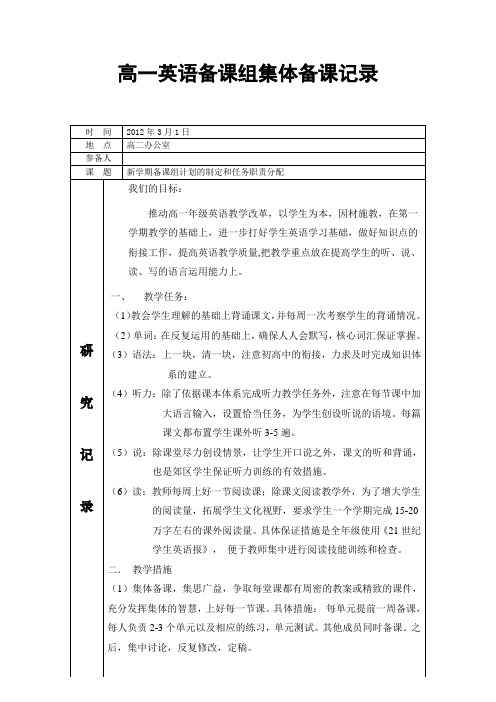
高一英语备课组集体备课记录时间2012年3月1日地点高二办公室参备人课题新学期备课组计划的制定和任务职责分配研究记录我们的目标:推动高一年级英语教学改革,以学生为本,因材施教,在第一学期教学的基础上,进一步打好学生英语学习基础,做好知识点的衔接工作,提高英语教学质量,把教学重点放在提高学生的听、说、读、写的语言运用能力上。
一、教学任务:(1)教会学生理解的基础上背诵课文,并每周一次考察学生的背诵情况。
(2)单词:在反复运用的基础上,确保人人会默写,核心词汇保证掌握。
(3)语法:上一块,清一块,注意初高中的衔接,力求及时完成知识体系的建立。
(4)听力:除了依据课本体系完成听力教学任务外,注意在每节课中加大语言输入,设置恰当任务,为学生创设听说的语境。
每篇课文都布置学生课外听3-5遍。
(5)说:除课堂尽力创设情景,让学生开口说之外,课文的听和背诵,也是郊区学生保证听力训练的有效措施。
(6)读:教师每周上好一节阅读课;除课文阅读教学外,为了增大学生的阅读量,拓展学生文化视野,要求学生一个学期完成15-20万字左右的课外阅读量。
具体保证措施是全年级使用《21世纪学生英语报》,便于教师集中进行阅读技能训练和检查。
二.教学措施(1)集体备课,集思广益,争取每堂课都有周密的教案或精致的课件,充分发挥集体的智慧,上好每一节课。
具体措施:每单元提前一周备课,每人负责2-3个单元以及相应的练习,单元测试。
其他成员同时备课。
之后,集中讨论,反复修改,定稿。
负责人内容核查人张萍萍Unit 1,2,7 (单元测试,翻译)汤桂玲Unit 3,4,8 (单元测试,翻译)张晓松Unit 5,6 (单元测试,翻译)(2)备课组成员平时互相听课,取长补短,共同提高。
(3)利用好网络和多媒体资源,丰富课堂教学形式,拓宽信息输入渠道。
(4)组织一次全年级的口语竞赛,总之,高一教育教学工作任务重,只要我们团结一致,互研合作,谦虚认真,辛勤耕耘,追求科学方法,创新课堂教学模式,培养英语能力,相信明天会更好!。
高一英语学科集体备课设计

当堂落实
教学内容
师生互动
修改意见
教学内容
师生互动
修改意见
教学内容
师生互动
修改意见
课前反馈评价
反思
感悟
教学内容
师生互动
修改意见
1. 10分钟讨论学案上的红笔标出的疑难问题,并展示答案
2. 10分钟讨论点评,确定正确答案后,翻译例句
3. 10分钟根据例句背诵知识点,对桌互查
4. 10分钟能力提升并展示答案
5. 5分钟当堂检测,巩固落实
语言运用
课前预习:提前利用小纸条的方式指导学科组长,利用课余时间根据《非常学案》预习知识点,形成对每个知识点清晰地知识网络,并提出本组的1-2个质疑的问题,准备好课前展示。
G5B层
G6 B层
后黑板
G9点评
活用小作文
G7G8 A层
前黑板展示
G10点评
第四步:小组讨论合作探究:
要求:1.讨论导学案上的疑难点,不明白的地方用红标出,准备质疑;讨论黑板上的展示,纠错,找出精彩处。
2.组长调控好,确保每一层次的学生都能最大限度解决问题,以备展示和质疑,保证高效完成。
第五步:精彩点评:点评小组的A层同学快速到黑板点评
课前
培训设计
人员组织
培训每个小组的B层展示单词短语的用法,培训3个A层点评单词、短语和句型
知识与能力
牢固掌握3个单词,7个短语和4个句型的用法,提升运用当堂内容创作短文的能力。
过程与方法
利用周二晚自习,老师利用小纸条的方式,布置给B层同学展示任务,让学生参阅《非常学案》完成学案,展示时要有总结,自己在学案上红笔标记疑难点。
3. A层创作小作文,并运用恰当的连接词和高级句式。
2017-2018学年第二学期高一英语备课组计划
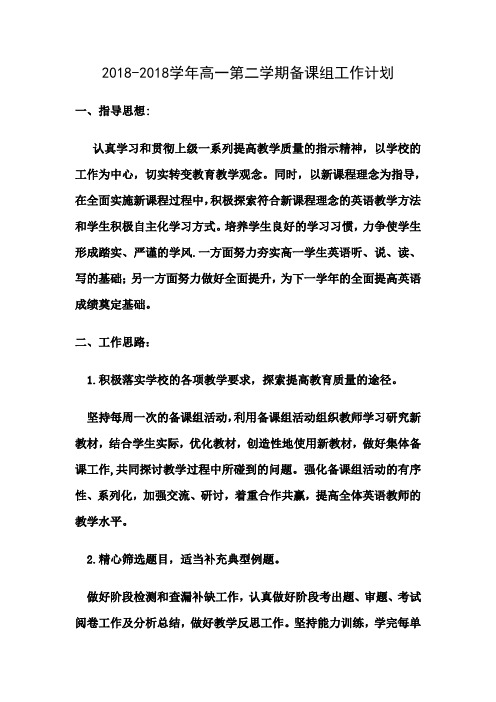
2018-2018学年高一第二学期备课组工作计划一、指导思想:认真学习和贯彻上级一系列提高教学质量的指示精神,以学校的工作为中心,切实转变教育教学观念。
同时,以新课程理念为指导,在全面实施新课程过程中,积极探索符合新课程理念的英语教学方法和学生积极自主化学习方式。
培养学生良好的学习习惯,力争使学生形成踏实、严谨的学风.一方面努力夯实高一学生英语听、说、读、写的基础;另一方面努力做好全面提升,为下一学年的全面提高英语成绩奠定基础。
二、工作思路:1.积极落实学校的各项教学要求,探索提高教育质量的途径。
坚持每周一次的备课组活动,利用备课组活动组织教师学习研究新教材,结合学生实际,优化教材,创造性地使用新教材,做好集体备课工作,共同探讨教学过程中所碰到的问题。
强化备课组活动的有序性、系列化,加强交流、研讨,着重合作共赢,提高全体英语教师的教学水平。
2.精心筛选题目,适当补充典型例题。
做好阶段检测和查漏补缺工作,认真做好阶段考出题、审题、考试阅卷工作及分析总结,做好教学反思工作。
坚持能力训练,学完每单元后,及时组织命制基础知识检测与能力提高检测,做好对单元教学效果的客观评价。
3.继续开展高效课堂模式探讨,提高课堂教学效率。
认真研究教材,开展高效课堂模式探讨,大胆改革原教学模式,提高课堂教学效率。
认真设计教学活动内容,在完成教学目标的基础上,灵活使用教材材料,进行优化整合。
提高年级整体教学水平与教学经验。
三、工作任务1. 有计划地进行全期的英语模块教学(模块3和模块4)。
集中学习一些语法知识,如名词性从句、主谓一致、宾语补足语、直接引语和间接引语、情态动词和被动语态;2. 提前为PETS过级的考生准备考题资料,并组织他们进行有效的培训。
3. 结合学校的要求,组织好本组内的老师积极有序地参加组内或学校的公开课。
4. 加强集体备课,倡导资源共享。
多进行听评课活动,提高老师的课堂效率。
5. 认真完成好期中和期末的两次结业考试的命题和阅卷工作。
高一英语集体备课发言稿

高一英语集体备课发言稿英文回答:Good morning, respected colleagues.As we embark on the new academic year, I am honored to share my insights on the collective preparation for our Grade 11 English language instruction. Collaboration is the cornerstone of effective teaching, and our collective expertise will undoubtedly enhance the learning experience of our students.Firstly, it is imperative that we establish a common ground by aligning our curriculum and teaching methodologies. By fostering consistency across our classrooms, we will ensure that students receive a cohesive and comprehensive education. This includes standardizing the syllabus, learning objectives, lesson plans, and assessment criteria.Secondly, sharing resources and ideas is essential for professional growth and innovation. We should create a repository of lesson plans, worksheets, and other teaching materials that can be accessed by all members of our team. Additionally, regular meetings will provide a platform for exchanging best practices, discussing student progress, and seeking support from our colleagues.Thirdly, differentiated instruction is key to catering to the diverse learning needs of our students. It involves tailoring our教学方法 to match the individual learning styles, strengths, and interests of each student. By providing a variety of activities, assessments, and support systems, we can ensure that all students have the opportunity to succeed.Fourthly, technology integration can enhance student engagement and facilitate learning. We should explore the use of digital tools such as interactive whiteboards, online learning platforms, and educational apps. By incorporating technology into our lessons, we can make learning more interactive, personalized, and accessible.Fifthly, assessment is an integral part of theteaching-learning process. It enables us to gauge student understanding, provide feedback, and track progress. We should develop a balanced assessment system that includes formative and summative assessments, as well as self-assessment and peer assessment opportunities.第六,家校合作至关重要。
新高一英语集体备课教案

新高一英语集体备课教案Title: Collective Lesson Plan for New High School Freshman English。
Introduction:As educators, it is crucial for us to work together to create effective and engaging lesson plans for our students. This collective lesson plan for new high school freshman English aims to provide a comprehensive and cohesive curriculum that will help students develop their language skills, critical thinking abilities, and love forliterature.Unit 1: Introduction to English Literature。
Objective: To introduce students to the world ofEnglish literature and develop their understanding and appreciation for different literary genres.Lesson 1: Introduction to Literature。
Begin by discussing the definition of literature and its various forms (poetry, prose, drama).Introduce students to the concept of literary analysis and the importance of understanding the historical and cultural context of a literary work.Lesson 2: The Elements of Fiction。
2018年高一英语第二学期英语集备组教学计划-精选word文档 (3页)
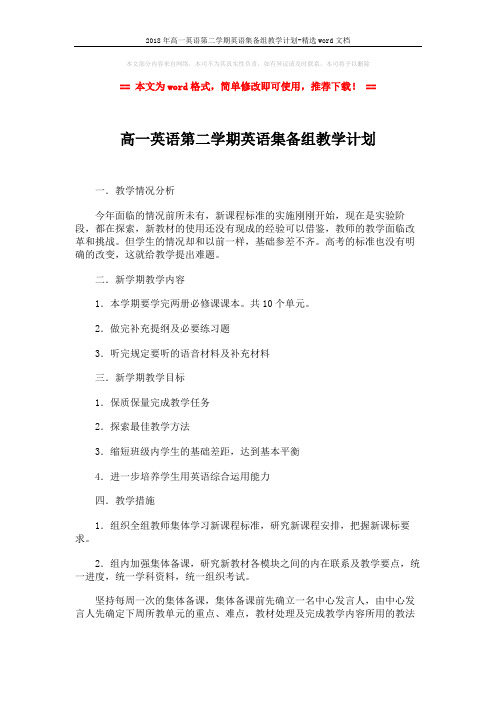
本文部分内容来自网络,本司不为其真实性负责,如有异议请及时联系,本司将予以删除== 本文为word格式,简单修改即可使用,推荐下载! ==高一英语第二学期英语集备组教学计划一.教学情况分析今年面临的情况前所未有,新课程标准的实施刚刚开始,现在是实验阶段,都在探索,新教材的使用还没有现成的经验可以借鉴,教师的教学面临改革和挑战。
但学生的情况却和以前一样,基础参差不齐。
高考的标准也没有明确的改变,这就给教学提出难题。
二.新学期教学内容1.本学期要学完两册必修课课本。
共10个单元。
2.做完补充提纲及必要练习题3.听完规定要听的语音材料及补充材料三.新学期教学目标1.保质保量完成教学任务2.探索最佳教学方法3.缩短班级内学生的基础差距,达到基本平衡4.进一步培养学生用英语综合运用能力四.教学措施1.组织全组教师集体学习新课程标准,研究新课程安排,把握新课标要求。
2.组内加强集体备课,研究新教材各模块之间的内在联系及教学要点,统一进度,统一学科资料,统一组织考试。
坚持每周一次的集体备课,集体备课前先确立一名中心发言人,由中心发言人先确定下周所教单元的重点、难点,教材处理及完成教学内容所用的教法和课时安排,然后全组人员共同探讨,最后确定下来。
中心发言人的依次轮流,顺序为:菊艳,,水兰,丁娜,郑舒。
3.组内教师互相帮助,互相学习,互相听课,取长补短,听课节数达到规定要求。
4.组内全体成员集体研究补充材料,群策群力,力争充分利用补充材料。
如英语周报5.全体成员加强与班主任及其他课任教师的联系,及时把握班级授课情况,以求班级成绩均衡。
6.全体成员抓紧基础薄弱学生的促进工作,在最短的时间内提高他们的学习兴趣,促使他们尽快赶上班级队伍,为班级总体进步扫清障碍。
7.加强教学过程中学生的主体地位,充分调动学生的积极主动性,做到寓素质教育于外语教学中,突出外语教学的人文特点,发展学生综合运用语言的能力,培养学生获取信息,处理信息,及分析问题解决问题,推出结论的能力。
高一英语集体备课资料

高一英语备课组集体备课资料主备人:薛丽芳成员:韦静王荣陈曦郭子倩备课内容:A night the earth didn’t sleep[教学目标]一、知识目标1.充分理解课文内容并完成所给的阅读任务。
2.掌握一些阅读技巧和方法。
3.学习有用的单词、短语和表达方式。
二、能力目标在运用语言的过程中培养学生的观察力、分析力、想象力和自学能力,帮助学生加强记忆力,提高思维能力和运用英语的综合能力,激发创造能力。
三、情感、态度与价值观目标①通过学习本文,使学生提高对自然界中灾难的警惕及采取预防措施。
②学习唐山人民勇敢面对自然灾害,积极进行灾后重建的精神及中华民族“一方有难,八方支援”的伟大民族精神。
③在教学活动中培养学生的合作精神和互助精神。
[教学重点]①阅读并理解课文,从而使学生了解地震前兆、地震危害和震后救援等相关知识。
②通过对本篇课文的阅读,掌握各种阅读技巧。
[教学难点]①阅读并理解课文,从而使学生了解地震前兆、地震危害和震后救援等相关知识。
②通过对本篇课文的阅读,掌握各种阅读技巧。
[教学方法]我在教学中淡化语言点和语法知识的简单传授,采用任务型教学法和小组合作探究学习法,从而扩大课堂的语料输入量及学生的语言输出量,注重培养学生“课前、课中、课后”良好的学习习惯。
我具体采用了以下教学方法:①提问法——逐步引导,逐渐深入;②自主探究法——学生实践,巩固提高;③归纳法与整理法——学生实践,形成积极的抽象思维;④讨论法——积极参与,总结规律,形成正确的自我评价与相互评价;⑤点拨法——展开联想,拓宽思路。
[教学时数] 1课时。
[教学过程]Step 1 Leading-in 导入Show some pictures to the students.Teacher: First let’s get to know the man, who is called Mr. Nature. He is very emotional. When he is happy, he stays calm and shows us beautiful natural scenery. But when he gets angry, he becomes a troublemaker and causes many natural disasters. Can you name the following natural disasters?Suggested answers: Flood, drought, fire, volcano, typhoon, tornado, rock-mud flow, snowslide, earthquakeTeacher: As we all know, an earthquake is a kind of common disasters. It can cause great damage to people. Have you ever experienced an earthquake?(Students’ answers)Teacher: Can you describe your feelings at that time?(Students’ answers)Teacher: Why does an earthquake happen?Suggested answers: Scientists believe that the surface of the earth is covered by a number of moving plates such as the Pacific plate, the Indian plate, the Eurasian plate, and so on. Sometimes two plates move towards and push against each other. Sometimes they stop for years but at other times they jump and an earthquake is felt. An earthquake is the result of the movement of these plates.Teacher: We know China is a country where many earthquakes happen. Why does China have a lot of earthquakes?Suggested answers: Because the Pacific plate is pushing China from the east and the Indian plate is pushing China from the southwest. The power of this movement created the Himalayas and Mount Qomolongma. It now causes earthquakes in China. Take the Wenchuan earthquake for example, the Indian plate moved northwards and put pressure on the Eurasian plate. It led to the rise of the Qinghai-Tibet Plateau. Then the risen Qinghai-Tibet Plateau moved eastwards and put pressure on Sichuan Basin. At last, the Wenchuan earthquake happened. Wenchuan is located on solid rock of the active earthquake belt, which makes the quake spread very far. It was felt in many provinces in China, including Shaanxi Province.Teacher: Usually we can see dark clods in the sky before rain. Dark clouds are a sign of rain. Similarly, something unusual often happens before an earthquake. What do you thinkwill happen before an earthquake?Suggested answers: There are bright lights in the sky. Chickens are flying and dogs are barking, and pigs and cows are too nervous to eat. Fish jump out of the pond, and mice ran widely out of the fields. The well has deep cracks in it and the water in it rises and falls. Teacher: If we can read these signs from natur e, it’s very useful for us to make good preparations for the coming disaster. Ok. 34 years ago, a strong earthquake hit Tangshan city and destroyed everything. Now let’s learn about the terrible earthquake. Turn to page 26. Look at the reading passage—A Ni ght the Earth Didn’t Sleep. What information does the writer try to give us through the title? / What does the title mean?Suggested answers: “The earth didn’t sleep” means the earth was active or the earth shook. “A Night the Earth Didn’t Sleep” is a poet ic way of saying that an earthquake happened at night. The title attracts people’s attention.【设计说明】为了调动学生的学习积极性,导入部分采用了多媒体动画、图片、文字等,形象直观。
高一英语集体备课发言稿

高一英语集体备课发言稿Learning English is a crucial aspect of personal and academic development for high school students. As a teacher, I believe that collective lesson planning and preparation are essential in ensuring the effectiveness of English language instruction. In this essay, I will discuss the importance of group-based lesson planning for high school English classes and provide insights into the key components of a successful collective lesson preparation session.Firstly, collective lesson planning allows for the sharing of diverse perspectives and experiences among English teachers. Each educator brings a unique set of teaching strategies, subject matter expertise, and classroom management techniques to the table. By collaborating and exchanging ideas, teachers can learn from one another, expand their repertoire of instructional methods, and develop a more comprehensive understanding of the subject matter. This collaborative approach not only enhances the quality of lesson plans but also fosters a sense of community and professional growth among the teaching staff.Moreover, collective lesson planning facilitates the alignment of curriculum and learning objectives across different classes and grade levels. When teachers work together, they can ensure that the content, skills, and assessments are coherent and consistent throughout the high school English program. This alignment helps students to build upon their previous knowledge and skills, creating a more seamless and progressive learning experience. Furthermore, it allows for the identification of gaps or overlaps in the curriculum, enabling teachers to make informed decisions about resource allocation and instructional priorities.Another key benefit of collective lesson planning is the opportunity to develop differentiated instructional strategies. High school English classrooms often comprise students with diverse learning styles, abilities, and language proficiency levels. By working collaboratively, teachers can design lesson plans that cater to the unique needs of their students. This may involve the creation of tiered activities, the incorporation of multimedia resources, or the implementation of flexible grouping strategies. Such differentiation ensures that all students, regardless of their individual strengths and challenges, can engage with the content and achieve their learning goals.Additionally, collective lesson planning fosters the sharing of resources and best practices. Teachers can collaborate to curate a comprehensive bank of lesson materials, including textbooks,supplementary readings, multimedia resources, and assessment tools. By pooling their resources, educators can save time and effort in lesson preparation, while also ensuring that their students have access to high-quality learning materials. Furthermore, the exchange of successful teaching strategies and classroom management techniques can help to improve the overall effectiveness of English instruction.Finally, collective lesson planning can enhance the professional development of English teachers. By engaging in collaborative discussions, teachers can reflect on their teaching practices, receive constructive feedback, and identify areas for improvement. This process not only strengthens their pedagogical skills but also cultivates a culture of continuous learning and improvement within the English department. As teachers work together to refine their lesson plans and teaching approaches, they can ultimately provide a more enriching and engaging learning experience for their students.In conclusion, the benefits of collective lesson planning for high school English classes are numerous and significant. By leveraging the collective expertise and resources of the teaching staff, educators can develop more effective and differentiated lesson plans, ensure curriculum alignment, and foster a collaborative, professional learning environment. As such, high school English teachers should prioritize regular collective lesson planning sessions as a means ofenhancing the quality of English language instruction and supporting the academic success of their students.。
2017年高一英语下学期备课组教学计划范文

2017年高一英语下学期备课组教学计划范文一、教材分析(结构系统、单元内容、重难点)本级教材共有两个模块组成,每个模块都包含有五个单元,每个单元一般都有arming up, pre-reading, reading, prehending, learning about language, using language, summing up and assessment, 以及orkbook等几个部分。
教师在使用本教材时,应注意根据学生的实际情况,对教材进行增、删、改以及重组教材。
二、学生分析(双基智能水平、学习态度、方法、纪律)学生的英语水平差异,一些学生学习方法不怎么好,因此学习积极性不很高,学习态度有待提高,有些学生学得不错。
三、教学目的要求培养学生的语言技能、语言知识、情感态度、学习策略和文化意识,发展学生综合运用语言的能力四、完成教学任务和提高教学质量的具体措施组织本备课组全体英语教师隔周集体备课一次,讨论单元重难点、练习、测试等教学问题。
2、互相听课,做到取长补短,共同提高。
3、拓宽教材,不断扩大学生阅读量,增加学生的词汇量。
利用课外阅读材料和自选阅读材料(包括限时阅读和《新概念英语》等),不断培养学生的阅读能力,扩大学生词汇量,为适应高考而做准备。
4、加强听力训练,不断提高学生听力能力。
五、教学进度周次课、章、节教学内容备注 1 unit1 festivals 2 3 unit 2 health eating 4 unit2-3 the millionpound bank note 5 unit3 the million pound bank note 6 unit 4astronom :the siene of the stars 7 8 unit 5 anada-the true north nelson mandela—a modern hero 9 10 期中考试 11 unit1 omen of ahievement 12 unit1-2 omen of ahievement orking the land 13 unit 2 orking the land 14 unit 3 a taste of english humor 15 unit3-4 a taste of english humor bod language 16 unit 4 bod language unit 5 theme parks unit 5 theme parks revision 20 期终考试 21 22 期末总结:12。
20172018学年高一英语下学期教学计划
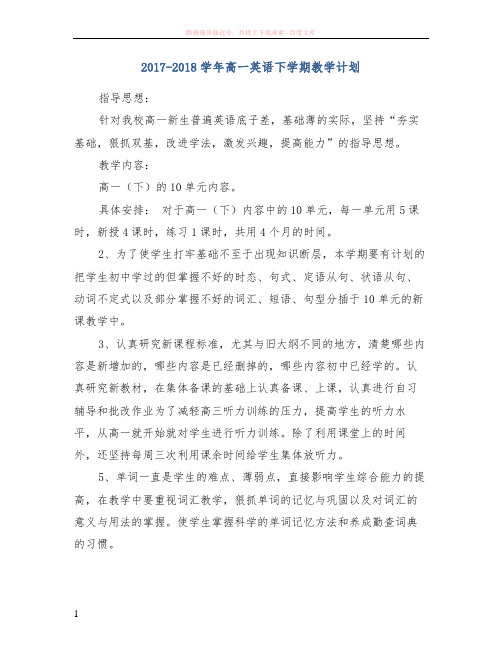
2017-2018学年高一英语下学期教学计划指导思想:针对我校高一新生普遍英语底子差,基础薄的实际,坚持“夯实基础,狠抓双基,改进学法,激发兴趣,提高能力”的指导思想。
教学内容:高一(下)的10单元内容。
具体安排:对于高一(下)内容中的10单元,每一单元用5课时,新授4课时,练习1课时,共用4个月的时间。
2、为了使学生打牢基础不至于出现知识断层,本学期要有计划的把学生初中学过的但掌握不好的时态、句式、定语从句、状语从句、动词不定式以及部分掌握不好的词汇、短语、句型分插于10单元的新课教学中。
3、认真研究新课程标准,尤其与旧大纲不同的地方,清楚哪些内容是新增加的,哪些内容是已经删掉的,哪些内容初中已经学的。
认真研究新教材,在集体备课的基础上认真备课、上课,认真进行自习辅导和批改作业为了减轻高三听力训练的压力,提高学生的听力水平,从高一就开始就对学生进行听力训练。
除了利用课堂上的时间外,还坚持每周三次利用课余时间给学生集体放听力。
5、单词一直是学生的难点、薄弱点,直接影响学生综合能力的提高,在教学中要重视词汇教学,狠抓单词的记忆与巩固以及对词汇的意义与用法的掌握。
使学生掌握科学的单词记忆方法和养成勤查词典的习惯。
6、坚持每周一次作文训练,训练题材、方法力求多样化,并能及时进行讲评。
鼓励学生写英文日记,对个别英语特差的学生尽量多批改、多指导。
7、阅读理解能力的培养是高中教学的重点,也是高考的重头戏。
在单元教学中专门抽出一节课作为阅读课,材料为课外五篇课外阅读理解,并且有计划的指导学生掌握科学的阅读方法。
8、集体备课是提高教学质量和整体教学水平的有力保证,有利于经验丰富的教师与年轻教师互为补充、共同提高。
坚持每周一次的集体备课,集体备课前先确立一名中心发言人,由中心发言人先确定下周所教单元的重点、难点及在高考中的比重及为完成教学内容所用的教法,然后全组人员共同探讨,最后确定下来。
9、坚持教学研究和相互听课,年轻教师要向老教师学习如何把握重点、难点和考点,老教师要向年轻教师学习如何灵活运用先进的教法。
高一英语集体备课发言稿

高一英语集体备课发言稿Good morning everyone, I hope you're all doing well. Today, I'd like to talk about our upcoming English curriculum for the high school freshmen. As we all know, this is a crucial year for our students as they transition into a new environment and face more challenging academic tasks. Therefore, it's important for us to carefully plan and prepare our lessons to ensure that our students receive the best education possible.First and foremost, we need to consider the key language skills that our students need to develop. This includes reading, writing, speaking, and listening. We should aim to create a balanced curriculum that provides ample opportunities for students to practice and improve these skills. In addition, we should also incorporate critical thinking and problem-solving activities into our lessons to help students become more independent learners.Furthermore, it's important for us to select engaging and relevant texts for our students to read. This could include literature, non-fiction articles, and even multimedia resources. By exposing our students to a varietyof texts, we can help them develop a deeper understanding of the English language and the world around them.In terms of writing, we should focus on teaching students how to express themselves effectively and coherently. This could involve teaching different writing styles, such as narrative, descriptive, and argumentative writing. Additionally, we should provide opportunities for students to receive feedback on their writing and revise their work accordingly.When it comes to speaking and listening, we should incorporate activities that encourage students to communicate with each other in English. This could involve group discussions, debates, and presentations. Bypracticing these skills in a supportive environment, students can become more confident and proficient English speakers.Finally, we need to consider the assessment methods that we will use to evaluate our students' progress. It's important for us to use a variety of assessment tools, including quizzes, essays, presentations, and projects. This will give us a more comprehensive understanding of ourstudents' abilities and allow us to provide targetedsupport where needed.Overall, I believe that by carefully planning and preparing our English curriculum, we can provide our students with a solid foundation in the English languageand set them up for success in their future studies and career. Thank you for your attention.大家早上好,希望大家都过得不错。
2017-2018学年度高一英语(第一学期)教学计划
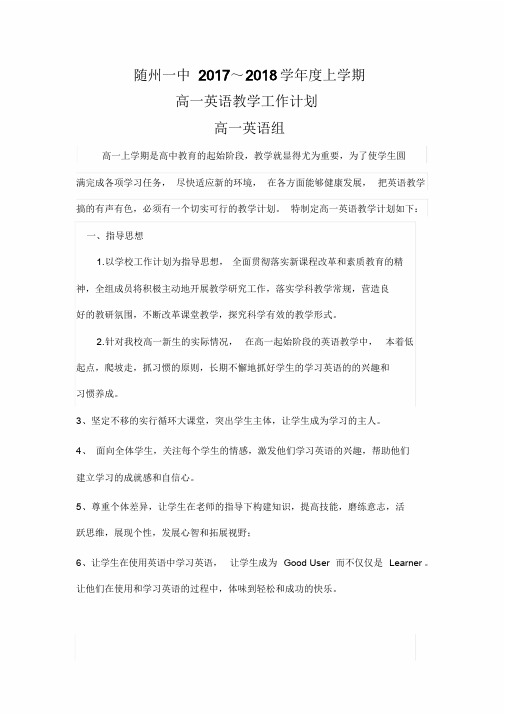
随州一中2017~2018学年度上学期高一英语教学工作计划高一英语组高一上学期是高中教育的起始阶段,教学就显得尤为重要,为了使学生圆满完成各项学习任务,尽快适应新的环境,在各方面能够健康发展,把英语教学搞的有声有色,必须有一个切实可行的教学计划。
特制定高一英语教学计划如下:一、指导思想1.以学校工作计划为指导思想,全面贯彻落实新课程改革和素质教育的精神,全组成员将积极主动地开展教学研究工作,落实学科教学常规,营造良好的教研氛围,不断改革课堂教学,探究科学有效的教学形式。
2.针对我校高一新生的实际情况,在高一起始阶段的英语教学中,本着低起点,爬坡走,抓习惯的原则,长期不懈地抓好学生的学习英语的的兴趣和习惯养成。
3、坚定不移的实行循环大课堂,突出学生主体,让学生成为学习的主人。
4、面向全体学生,关注每个学生的情感,激发他们学习英语的兴趣,帮助他们建立学习的成就感和自信心。
5、尊重个体差异,让学生在老师的指导下构建知识,提高技能,磨练意志,活跃思维,展现个性,发展心智和拓展视野;6、让学生在使用英语中学习英语,让学生成为Good User 而不仅仅是Learner 。
让他们在使用和学习英语的过程中,体味到轻松和成功的快乐。
二:工作目标1、树立全国领先、全省一流、全市第一理念,确保英语成绩在随州全市的龙头老大地位。
2、确保文理科英语一本上线率和特高分(140分)人数第一,一本上线率在全市有绝对优势。
3、确保文理科最高分落于我校,前5名确保在我校,前10名中保持前8名在我校。
前20名占四分之三,前50名占三分之二,前lOO名占70%。
4、教师竞赛获奖目标市级力争全部一等奖。
确保二等奖,确保由我校教师代表市直学校参加省级比赛并获一、二等奖以上。
5、“一师一优课’’任务全部完成确,保获得国家级、省级“优课”人数在本年级各学科中名列前茅。
6、继续教育100%达标。
7、教科研成果方面,如课题研究、优质课、发表论文或优秀论文数在各学科中名列前茅。
- 1、下载文档前请自行甄别文档内容的完整性,平台不提供额外的编辑、内容补充、找答案等附加服务。
- 2、"仅部分预览"的文档,不可在线预览部分如存在完整性等问题,可反馈申请退款(可完整预览的文档不适用该条件!)。
- 3、如文档侵犯您的权益,请联系客服反馈,我们会尽快为您处理(人工客服工作时间:9:00-18:30)。
复习
导入
巩固记忆
(8’)
1.Recite the key words and phrases and the usage of them.
2.Finish the exercises inreference books(P2,)知识清单
3.Word formation:1).名词动用词汇
①harvestn.收获;收割→v.收获;收割
②trickn.诡计;恶作剧;窍门→vt.欺骗;诈骗
③awardn.奖;奖品→vt.授予;判定
2).名词后缀:-tion,-ence,-al
①celebratevt.庆祝,歌颂→celebrationn.庆祝,祝贺
②admirevt.赞美;钦佩;羡慕→admirationn.钦佩,赞赏
③independentadj.独立的,自主的→independencen.独立,自主
④starvev.(使)饿死,饿得要死→starvationn.饥饿,饿死
⑤arrivevi.到达→arrivaln.到来,到达,到达者
3).否定前缀:in-
①dependent(依赖的)→independentadj.独立的;自主的
②dependence(依赖)→independencen.独立;自主
情感态度价值观
1. Let students know that every one of us must have a friend or some friends in our daily life.
2. Cultivate the spirit of cooperation by working in groups.
2017-2018学年度秋季学期高一英语备课组备课稿
主备教师:陈贤模集体讨论时间:2.26
备课单元
Book3 Unit 1Festivals around the world
备课周次
第一周
备课内容
New words and expressions
课时安排
第一、二课时
学习目标
知识与技能
1. To remember thewords and phrases(take place---Christian permission).
课堂教学流程解读
复习导入(4’)
1.Talk aboutfestivals around the world, especially the Spring Festival in China
独立自学(10’)
1.Preview and learn the new words by themselves according to the phonetic symbol.
3.The students tare able to develop the reading skills of skimming, scanning, fast reading, careful reading and summarizing.
过程与方法
Self-reading and comprehending, discussing in groups, presentation, questioning.
情感态度价值观
1. To become interested in word study through interesting pictures, exercises and cooperationand grasp the skills of learning words & phrases.
2. To realize the importance of cooperation and the spirit of teamwork .
备课单元
Book3 Unit 1Festivals around the world
备课周次
第一周
备课内容
Warming up, Pre-reading, Reading
课时安排
第三、四课时
学习目标
知识与技能
1.The students are ableto talk aboutthe Spring Festival in China.
2.The students are able tounderstand the details about the passage, choosing the correct answer according the text and fill in the form about the passage and the diary.
合作探究与交流展
示(12’)
1.Get the students to discuss the usage of8key words and8phrases in groups:
according toreference booksP6-9.
2.The teachercanadd some pointsif necessary.
2.Touse7wordscorrectly:religious,belief…
3.To use8key phrases correctly:take place,in memory of…have fun with
过程与方法
Self-reading、check in groups、discuss in groups、presentation、feedback
训练反馈
(6’)
Dictate the following7key words and8phrases :(分解在2 periods中)
总结提n课时作业(1)
课后随笔
2017-2018学年度秋季学期高一英语备课组备课稿
主备教师:陈贤模集体讨论时间:2.26
2.Underline the words and phrases they can’t read .
3.Ask the best student to read the words and expressions aloud.
4.The teacher correct the pronunciation..
